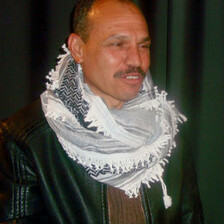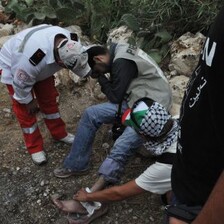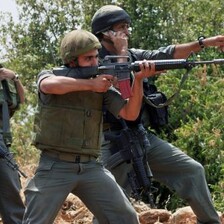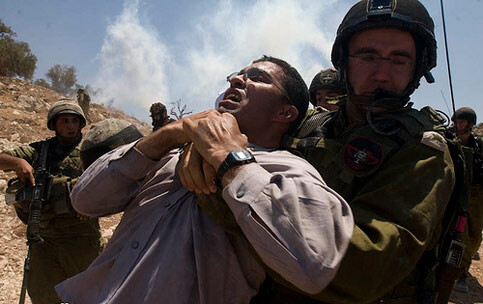
Hassan Mousa being arrested during a demonstration at the wall. (Activestills)
Situated just west of Ramallah, the Palestinian village of Nilin has lost huge swathes of land to Israel’s settlements and its wall in the occupied West Bank. In a year and a half of resisting construction of the wall, five villagers have been murdered by the Israeli military while demonstrating. Hassan Mousa is a coordinator of the Nilin Popular Committee Against the Wall and Settlements and the uncle of Ahmed Mousa, an 11-year-old boy who was the first villager from Nilin to be killed by the Israeli army.
The following is Hassan Mousa’s story as told to The Electronic Intifada contributor Jody McIntyre:
On 29 July 2008, while the apartheid wall was still in the planning stages, there was an evening demonstration here in Nilin. We wanted to send a message to the Israeli settlers who were already living on and stealing our land, that this wall is being built at your request, so you must pressure your government to stop construction, and put an end to the suffering of the Palestinians living here. We knew that they were saying the wall was being built for security, but we believe that it is purely a land grab and an extension of the existing illegal settlements built on our land since 1967. So that was the message of the demonstration, that you can never have security while others are suffering.
At the time, there was no real presence of soldiers, just a single jeep parked far away from the place of the demonstrators. When they suddenly heard the sound of the demonstration coming toward the planned site of the wall, the jeep drove up very close. The young people started moving the children and old people back toward the village, as they were understandably concerned for their well-being.
As my nephew Ahmed was walking back his sandal slipped off his foot. He put his bag down to get it but the bullet was faster. According to eye-witnesses, three soldiers got out of the jeep; the first shot a sound bomb, the second shot a round of rubber-coated steel bullets, and the third shot directly at the head of my nephew with a live bullet. He was shot deliberately. The people nearby tried to rescue him — they said that while they were carrying him toward the ambulance, pieces of his brain slipped down onto their shoulders. It was a serious experience for them … they couldn’t understand how brutal and savage the soldiers had been, to kill a ten-year-old child.
Ahmed died immediately, but the paramedics needed to wait until they arrived at the hospital for an official confirmation. When the news of his death came out in the media, the Israeli army announced that there had been a case of killing in Nilin, but that it had been a result of internal conflict between families in the village. The actually said that he was killed by another Palestinian!
The Palestinian Authority decided to conduct an autopsy, and it was found that he was killed by a live bullet. After that, the army admitted to killing him, but didn’t bother to give a reason. We are in the process of taking the army to court now.
Ahmed was a very active person among his friends, and loved by all. He was helpful and obedient to his parents. He never harmed anybody. For me, he was my favorite nephew, and his parents knew that. I used to tell them not to shout at him, because he was so sweet. His death truly affected me, and I have his poster displayed in my house. But the image of Ahmed is in my heart.
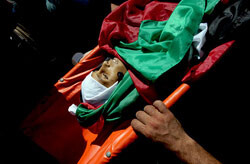
Ahmed Mousa being carried through his funeral. (Activestills)
The news came to his brothers as a huge shock, because they had been playing together in their uncle’s house just an hour earlier. Ahmed told them he wanted to go home to take something from the fridge, left the house, and went towards the demonstration.
It was very difficult for his brothers. Sometimes they make a mistake and call one another Ahmed, because they are so familiar with his name. At first they couldn’t enter his room. At night they would dream about him, and wake up in the morning to tell their father that they had seen Ahmed and he was happy.
Now that time has passed they have gotten used to the idea of his death, but they keep his pictures on the walls of their room and on the computer. If you go to his house, you feel as if Ahmed is still present. He was very dear to them.
At the funeral, I told the people that Ahmed’s blood planted the seeds for thousands of people to follow in his footsteps, and more than a year and a half later, this has been proven. Four more have died since, because they decided to follow in his footsteps.
Killing Ahmed did not suppress our demonstrations, it made our demonstrations stronger. The Israeli army soon realized that the murder of Ahmed was a very basic mistake in Nilin.
The second martyr, Yousif Amira, was from the same neighborhood as Ahmed, and on the morning of Ahmed’s funeral he asked the people, “If I am martyred, will you make a huge funeral for me as you did for Ahmed?” That same day he was killed near the entrance of Nilin. He spent three days brain-dead, and then died. We accomplished his wish of a huge funeral, with sweets thrown from rooftops as his body was carried through the streets.
The blood of Ahmed has aroused a patriotic passion in Nilin and awareness that the wall is illegal and we must resist it. I believe that the killing of Ahmed will be the start of our victory in Nilin.
Almost 18 months after his death, the wall in Nilin is now complete. According to the Israeli military’s plans, it was supposed to be completed within six months, but we succeeded in delaying construction for another six. In the past we could get to the bulldozers that were digging on our land and stand in front of them. Sometimes we would get them to move back, sometimes the guys from the villages would break the bulldozers with stones and stop work for a long time.
At first the wall was built as a mesh and barbed wire fence, but they soon realized that it was useless. Here in Nilin, we have a practical way of resisting the wall, so we would reach the fence and cut it in many parts every Friday. So, after the killing of Akil Srour in June of this year, the fifth person to be killed during our nonviolent demonstrations, the army decided that they would stop invading the town as they had done in the past. Before, we would find the soldiers waiting for us in the trees 300 to 400 meters away from the wall, just to stop us from getting there. Instead, they decided to change the wall from a fence to concrete blocks. Nilin became the first village in the West Bank to have these concrete blocks — the concrete version of the wall was previously built in the main population centers, but never before in a village.
Despite this, we managed to damage the concrete wall twice. The army was in a state of shock. What is happening here is unnatural. The people of Nilin are not ordinary, and that is because of the high price we have paid for our resistance, and the suffering we have seen. It is the Israeli army’s aggression, and Israeli crimes, that makes the people more united and more determined to resist.
Now, they have tied all the concrete blocks together with a huge strip of iron and massive screws … again, this is the first place this has happened. They don’t want us to pull the wall down again, but I am sure the people are going to discover many miracles here. We will invent a way to damage the wall again.
Our hope is that the model of nonviolent resistance practiced here in Nilin can spread across Palestine. At the moment, we feel the massive presence of soldiers in Nilin, but if other villages and towns were having one demonstration per week, the number of soldiers would be distributed. The army would be in a state of confusion. We Palestinians have come to the conclusion that the Israeli government does not want peace, so it is time for us to put an end to this occupation.
Jody McIntyre is a journalist from the United Kingdom, currently living in the occupied West Bank village of Bilin. Jody has cerebral palsy, and travels in a wheelchair. He writes a blog for Ctrl.Alt.Shift, entitled “Life on Wheels,” which can be found at www.ctrlaltshift.co.uk. He can be reached at jody.mcintyre AT gmail DOT com.
